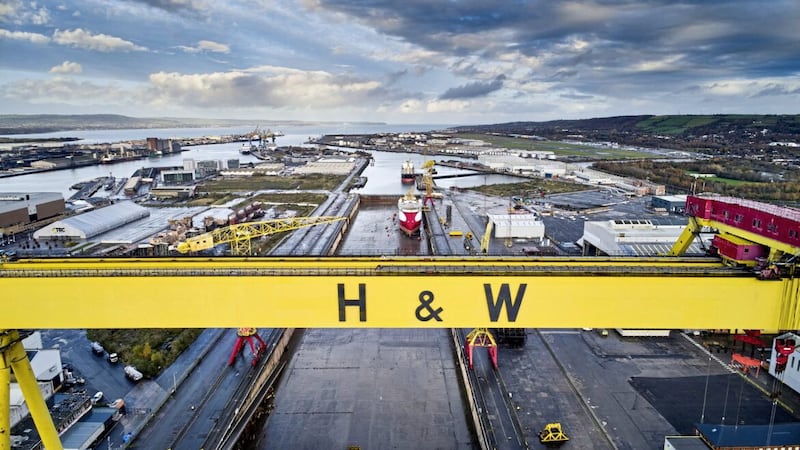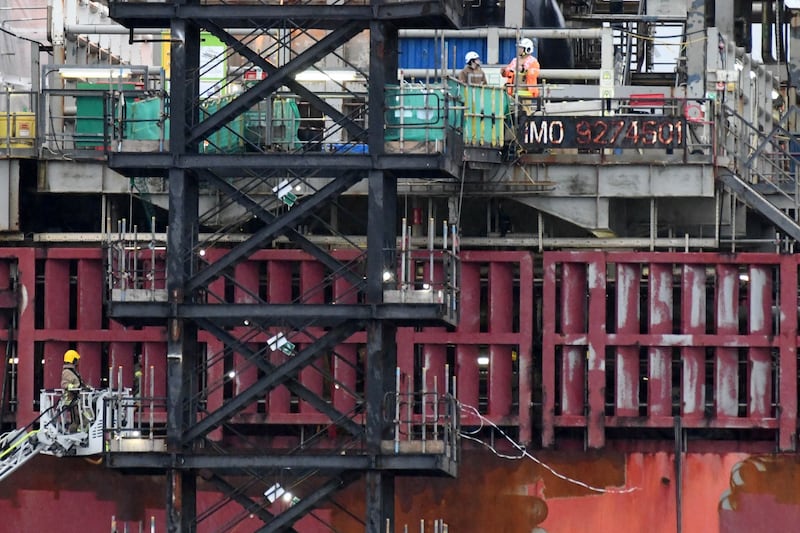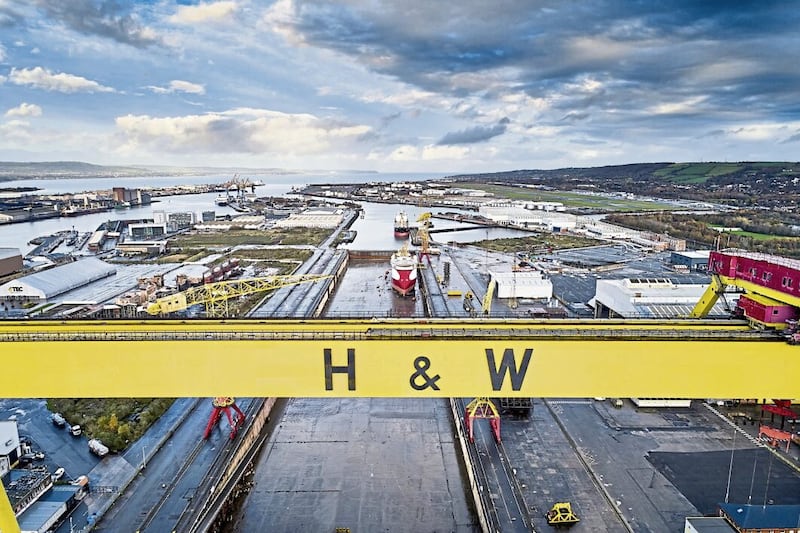THE parent group of Belfast shipyard Harland & Wolff is in talks to secure a £200 million debt refinancing deal after reporting losses of £70m for last year.
Harland & Wolff Group Holdings saw revenues rise from £18.5m in 2021 to £28m for the year ending December 31 2022. But its losses in that period soared from £25.5m to £70.4m.
The London-listed group, which also owns three other shipyards in Devon and Scotland, has secured a number of potentially lucrative contracts in recent months, including a subcontract with Spain’s Navantia to build fleet solid support (FSS) vessels for the UK Ministry of Defence (MoD).
Harland & Wolff said it expects to earn around £750m from the deal, but production for the seven-year programme is not due to start until 2025.
The group’s latest annual report, published over the weekend, revealed Harland & Wolff’s net debt increased from £14m in 2021 to £82.5m last year.
The report states: “This highlights the fact that we are under-capitalised and would need to balance our capital stack in due course.”
Harland & Wolff said it entered a corporate debt arrangement in March 2022 with New York-based Riverstone Credit Partners.
Read more:
- Harland & Wolff expect to report loss of £70m for 2022
- Harland and Wolff formally sign £800m subcontract for naval shipbuilding
The debt facility was later increased from $35m (£27.6m) to $100m (£78.8m) by the end of last year.
Harland & Wolff said it hopes to more than double the size of the debt facility within the next few months.
Its report states: “Negotiations [are] ongoing to complete a £200m refinancing facility with UK Export Finance guarantees and a syndicate of private lenders and commercial banks, expected to complete in early autumn 2023”.
UK Export Finance is a British Government department, which can offer partial guarantees covering up to 80 per cent of the risk to lenders.
However, in the section of its annual results assessing potential risks to the business, Harland & Wolff said while there is no indication that the financing will not be forthcoming, it admits there can be no certainty that it will be successful.
“Should the company not be successful in raising these additional funds and continues to retain its current cost base, a material uncertainty exists that may cast significant doubt on the group's ability to continue as a going concern.”
Concerns over Harland & Wolff’s balance sheet were raised earlier this year in a hearing before Westminster’s Defence Committee to scrutinise the FSS contract awarded to Navantia.
In a series of pointed questions put to Royal Navy vice admiral Paul Marshall, Labour MP Kevan Jones said: “Navantia UK got this contract by using Harland and Wolff as a poster in the window, didn’t it? Harland and Wolff cannot actually deliver this contract, can it?”
The vice admiral responded: “I believe it can, and I believe we have the right contract to incentivise that and the right level of capital investment in Harland & Wolff.”
The hearing took place on January 31, well before Harland & Wolff disclosed its 2022 financial statement.
But pointing to the group’s 2021 financial results, when it recorded a £25m loss on a turnover of £18m turnover, Mr Jones said: “What reassurances do you have that Harland & Wolff can deliver this in terms of the capital? Where is the capital coming from to do it?”
In his reply, vice admiral Marshall said: “Throughout the competition and as part of the assessment criteria, there was appropriate financial scrutiny, which included the recognition that Navantia is the prime in this and the financial instruments.”
Kevan Jones then questioned why a £55m minesweeping contract was awarded to Harland & Wolff’s Appledore shipyard in Devon.
“If you look at Appledore, it has no money; I think its shareholding is only £5,” said the MP.
“I just do not get my head around why alarm bells are not ringing about the financial position of Harland & Wolff to fulfil this contract,” he added.
Despite the soaring debt, Harland & Wolff’s group chief executive, John Wood claimed “significant progress” had been made in 2022, with the contracted backlog now sitting at around £900m.
“Whilst the FSS subcontract is a game-changing contract win for the company, it will take several years to deliver and we still have a lot to achieve over the next two years in order to turn this Company into a target £500m per annum business,” he said.
Elsewhere, the latest annual report from Harland & Wolff confirmed its workforce grew by 359 people to 769 at the end of 2022.
As part of the FSS subcontract with Navantia, Harland & Wolff said it will invest £77m into its Belfast shipyard, with plans to add up to 1,200 shipyard jobs in both Belfast and Appledore.








